Isaiah confronts a nation drowning in sin and points out what God sees—
Corrupt political and spiritual leadership in a society of grasping materialism, drunken pleasure-seeking, defiant sinfulness, moral perversion, and arrogant conceit.
These are the specific sins that God identifies as the reason for the destruction of Israel
Plus—the Assyrians were at the door,
The Babylonians were right behind them,
Jewish Society was rotting,
The Temple worship of God was dying out,
Satanism was growing all around…
Transcript
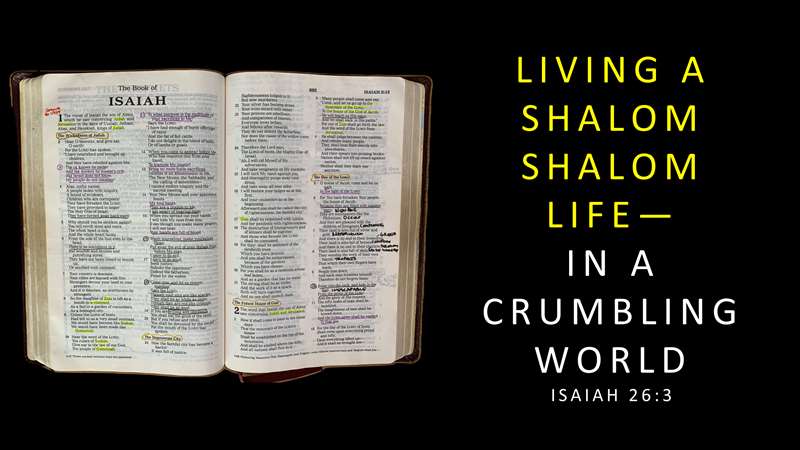
Father in Heaven, I thank You for Your Word, Your living and abiding Word, for Your Word that transforms us. Sanctify them by Thy truth. Thy Word is truth. And so, we invite You to sanctify us, make us useful to You, by Your truth, through Your Word, in Jesus’ name. Amen.
Now I can't believe that I get to run right from Proverbs to Isaiah with you guys. This is thrilling. Isaiah was the favorite book of the New Testament writers. So, if you haven't picked a favorite book yet, Isaiah could be one of your favorite books. For me, it's probably the most exciting book for me to teach. I love Revelation, I love Titus, I love all the Bible, but Isaiah is different.
For this purpose and right here it is, my favorite verse in Isaiah is right here, Isaiah 26:3. And if you get your Bibles, I want to show you something interesting that, that helps me communicate the book of Isaiah. Isaiah was writing at a time that you can imagine right now would be like the war in Gaza. I don't know if you're tracking, but right now the Israeli army, one of the most powerful armies in the world, literally, has completely encircled the city of Gaza, and they're moving inward trying to get to Hamas leadership.
The most powerful army in the world back then was the Assyrian army, in Isaiah's time, and during the book of Isaiah the Assyrian army completely encircled Jerusalem. Only, unlike the Israelis, the Assyrians had a different method of conquering. They're method, they were truly terrorists. Because what they did is: they would go in and make attacks on the city, they would collect leaders of the city (military, political leaders), they would take them outside the city, they would, (and there are actual, in the museums, stone carvings of this), they would spread eagle them, they would tie their ankles in their wrists, and they had a special core that skinned the person alive. They would pull their skin off of their body while they were alive. Can you imagine what the person would do? They would scream, they would yell, in full sight of the city. Then, they would make their next conquest, and everyone they conquered would die. They would cut them up and stack their bodies in piles. This was total terrorism.
Now look what Isaiah 26:3 says. This is the message of Isaiah. While Jerusalem was facing that army coming at them, the Assyrians. Now, in the course we're going to find out God did something unique. What did He do to the Assyrian army? Does anybody, have you already read Isaiah? What happened to the whole army? 185,000 of them. In one night, the whole army was out there. Do you know how big a camp with 185,000 people is? They were right outside the wall of Jerusalem. If you ever go to Jerusalem, Steve can take you there, you can stand on Hezekiah's wall, it's still there, and you can look and think about a normal campsite. You know how many square feet it takes for your tent and your junk? Imagine 185,000 soldiers in a campsite. You can see them all out there. Looking off the wall. And they're coming to skin alive one of your friends, or to cut your head off. And everyone was terrified. And that night, Isaiah takes the letter of the king that, that he got from the Assyrians, saying, I'm going to cut your head off and everything, and he spread it out before the Lord in the temple. And that's all he did. It says he spread it out before the Lord. And that night the angel of the Lord came and killed, in their bed, all 185,000 soldiers. And that morning, the king woke up, his name was, Sennacherib II, and his entire army, every soldier was dead, but not the other people. An army had 185,000 soldiers. They had about 100,000 other people that carried all the gear, cooked the food, did everything, made the arrows. They all were still alive. They weren't soldiers. They just were workers, slaves, and they carried all the junk home with the king. And when the king got home, his son assassinated him. Isn't that interesting?
Look at this. Living a shalom, shalom life in a crumbling world. That's what the whole book of Isaiah is about. And Isaiah 26:3 shows us one of the most beautiful pictures. Let me read it to you. This is what Isaiah wrote, as the Assyrians were at the door, behind them the Babylonians were coming, the whole society was crumbling, everybody was scared to death, the religious leadership was corrupt, the political leadership was corrupt, and this is what it says, "In that day this song will be sung in the land of Judah."
Verse 1, "We have a strong city. God will appoint salvation for walls and bulwarks. Open the gates that the righteous nation which is, keeps the truth may enter in." Verse 3, "You will keep him in perfect peace whose mind is stayed on You, because he trusts in You." Now the word in that verse "perfect peace," that's the English. If you have, do all use Logos here? No, yes, some of you? In Logos, if you go there, click on that and go there. You know what you'll find? Fascinating. Under the word perfect and peace, in Logos, it will show you the Hebrew word, and in the New Testament, it will show you the Greek word. If you look at this verse, you know what you'll find? The word peace is the word shalom. The word perfect is the same word. It's a repetition of one word. In the Hebrew language, if you want to emphasize something, they didn't have bold. Like you do on your computers, you just hit the B, and the word gets bold. Or you hit the I, it gets italicized. Or if you hit the U, it gets underlined. In Hebrew, the way you emphasize something is by repeating it. And the most repeated thing in the whole Bible, it's the only thing that comes out three times, is a hymn, and the hymn goes like this. Holy. Holy. Holy. Anybody ever heard that hymn? That's right out of Isaiah. It's a description of God. It's, God is not just holy, or not just holy. He is the highest. He is... The most emphatic you could say something in the Hebrew language is to say it three times. Guess what this verse does. It's the second highest emphasis. There are few things that God, only God gets the triple, and a few things get the double. So, this verse says, God will keep you in, shalom, shalom, even though your whole world is crumbling.
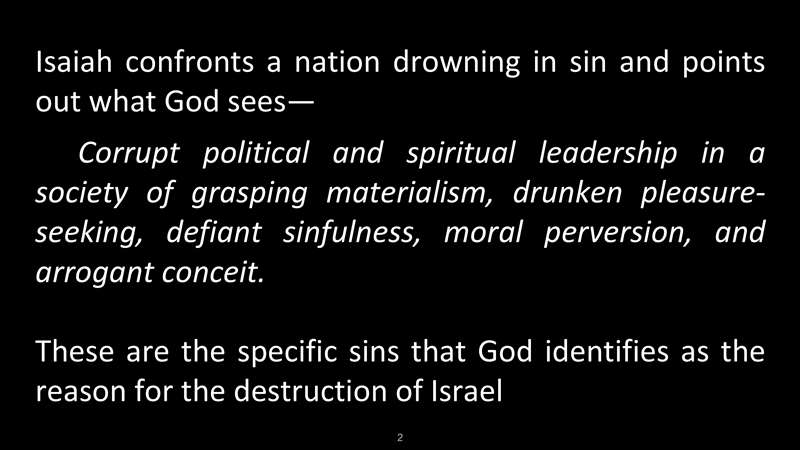
Let's talk about Isaiah. Isaiah, the book of Isaiah, was written by Isaiah the prophet, who was confronting a nation drowning in sin and pointing out what God sees. The whole political system was corrupt. The spiritual leadership in the society was also corrupt. The people of the country were materialists. When we get to chapter 5, do you know what it says about the people? It says that they built houses. Next to each other, leaving no room around the houses because they wanted to put as many houses as they could on one little piece of land. And back then, that was really hard for people because everyone had to have a garden, and so they could only buy a house because the people were so grasping in their materialism.
They were drunken. It says that they drank their wine not out of a cup. They drank it out of a bowl. You understand? They really were loving to drink. They were pleasure seeking. They were defiant in their sinfulness. They were morally perverse. In fact, there's an Old Testament word, Kadosh, that was used for males pursuing males. And it said that there was great, what we would call today, homosexuality, that was a moral perversion. Plus, they were arrogant and conceited. I don't know if you've ever seen a proud person. Bonnie and I were traveling, and we went through an airport, and there, there was this group that walked through the airport, and they just walked through and bumped everybody like no one else was in the airport. They acted like they were the only ones there, and they just were, you could see on their faces, they were so arrogant and conceited, and they just pushed everybody out of the way. That's what the whole nation of Israel was like, and those are the specific sins that God identified for why He sent the Assyrians, and the Babylonians, to judge Israel. So that's what the book of Isaiah is about.
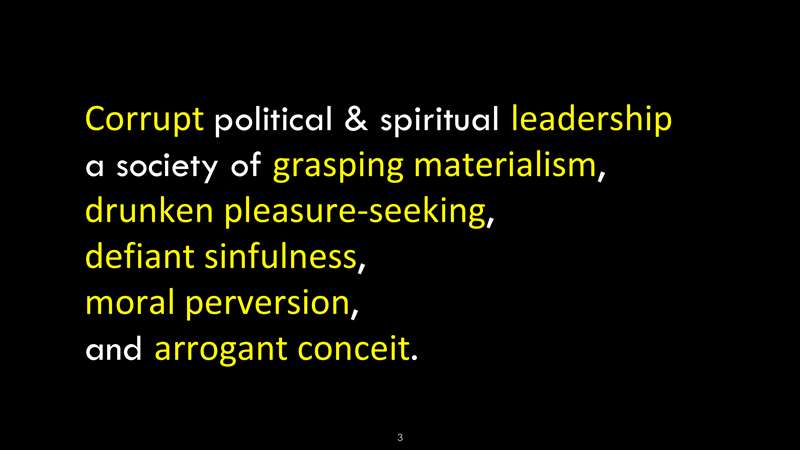
Now, just back up. Think about what it means to live where the political leaders and the church leaders, the spiritual leaders are corrupt. That means you can't turn anywhere. You go to church and they're corrupt. You work in society and the people making the laws and everything are corrupt, too. So, it's like you're hopeless. You're living around people that don't care about other people. They only care about more for themselves. They're drunk. Did you know when people are drunk, drunk drivers, they kill other people and they don't even know it, right? They're just without any concern. Defiant in their sinfulness. It's like I'm going to sin no matter what the law says. Morally perverse.
By the way, what had Israel come to in this time? They had come to baby sacrifice. In the valley of Topheth, it's called, the Hinnom Valley, the people burned their babies on a fire, alive, as an offering to Moloch, the horrible god of the pagan people. In fact, the king at this time, his name was Hezekiah, his son Manasseh was the very worst of all the kings of Israel. So, there was moral perversion and that arrogant conceit.
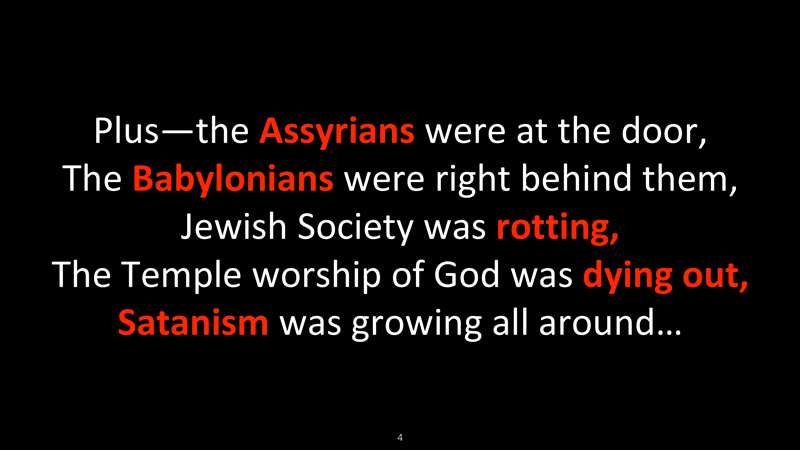
On top of that, the Assyrians were at the door, remember the terrorists that, by the way, the Assyrians also impaled people. They would put them on a stake. Like a marshmallow that you're skewering. They just push people on steaks. They would cut them and put the piles, like I told you. Those people were at the door of Jerusalem. The Babylonians, which were going to conquer the Assyrians, were right behind them. Jewish society, because politically and religiously, it was corrupt, was rotting. The temple worship was dying out. People didn't even want to go to the temple, and this worship of Satan causing the baby burning was growing.
Now isn't that interesting?
If I say enough, do you know what this sounds like? Have you ever thought about this? This is much like what American society is like right now. We have all those same elements. Did you know right now the fastest growing campus movement are Satanism clubs? Did you know that Christianity is dying out? The Southern Baptists are losing. This... The Southern Baptists are the bellwether, they're like the American denomination, the biggest one, their, their number of people attending, it's going, if you look at a graph, it's going just like this (Dr. Barnett illustrates his point using his hand). Churches are dying, COVID just about wiped out many churches. You add on that, our society is rotting. We can't even get political people on a microphone to say, what is a man? You can't get someone to say what is a man and what is a woman because it's politically incorrect to differentiate between males and females.
Right now, we have six foot four men parading as women winning women's swimming contests. Are you all reading the news? The number-one woman swimmer in the world is a six-foot four man at University of Pennsylvania. One of the female volleyball players came down from a spike and broke the teeth out of one of his fellow players. He was on the women's volleyball team. And he's a 6-foot, 200-pound man. Yeah, I like that. You're going, what? Doesn't that sound crazy? That's what American society is like. It's quite similar.
And by the way, the Assyrians and Babylonians, for us, are the Chinese and the Russians. We know from Scripture, China and Russia are around at the end. Do you know what is not in the Bible? America. So that's something to think about. How do you live in a society like that?
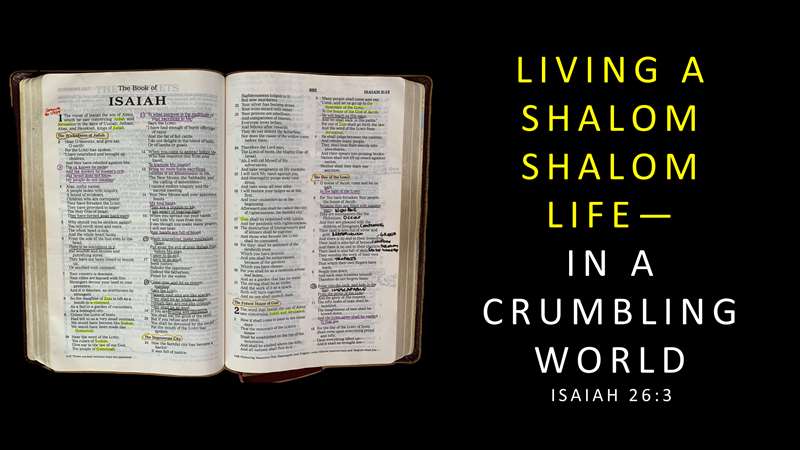
That's what the whole book of Isaiah is about. I think that's why it's the most exciting book. Any of you that are Americans, maybe the Canadians, are living in a society, and some of the Koreans, and maybe some of those from Taiwan and some from Japan are living in a society that's very much like Isaiah's, where Christianity is either nonexistent or declining, where morals are either non existing or going down, and where everything that was normal is crumbling.
And so, what does God say you do? Do you get scared? Do you run away? Do you know some people in America what they've done? They have built places to go when the world ends. Bonnie and I met a couple that did that. They bought 600 acres out in the country, that's a square mile by the way, and in it, they put up a fence, and they bought oil, and made a generator, and they bought all this, and they built a compound, and they put up all kinds of stuff, and they said when culture crumbles, we're moving to our square mile. Is that a good idea? I won't comment on that. What I will say is, what does God say you do when the whole world is crumbling?
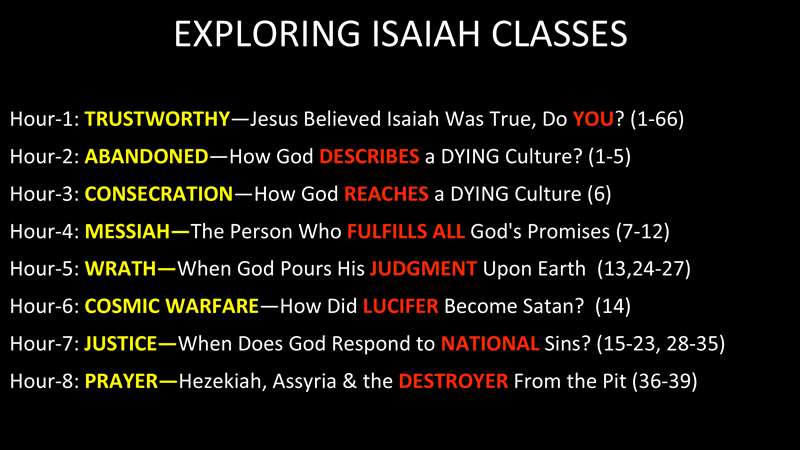
And this is what He says, and this is our... all I'm supposed to do in this chapel is give you part one of our one, which is the introduction. This is why I love to teach Isaiah.
In our 15 hours, I'm going to first survey the whole book with you on the trustworthiness of the Bible because Jesus believed Isaiah was true. Isn't that neat? And all the New Testament writers believed it was true. Number two, God describes what a culture looks like that's dying, and that'll be our second lesson. What happens when a culture abandons God? And what you're going to see is the eerie similarities between Western society today and Israel back then. Then, how does God reach a dying culture? That's chapter 6 of Isaiah. 1-5 shows the dying culture. God basically says it's corruption just rotting, as I called it. How do you reach it? God says, when a culture abandons God, I need people that will be like Isaiah in chapter 6.
Do you remember Isaiah? God consecrated him. He said, Isaiah confessed, he says, I'm a man of unclean lips. I feel sinful. God says, you are, but I'm going to cleanse you. And He consecrated him. So, we're going to look at consecration, how God reaches a culture.
Then God says what do we present to people? What do they need in a dying culture? They need a Messiah. Christ, Mashiach, the word Christ is the Greek. That's the Greek form, Christos, of Mashiach. Mashiach means the anointed one, or Messiah, or do you know what it really means in Hebrew? The one who fulfills all the promises. Do you know why the Jewish people wanted the Messiah? Because He's the one that would do everything God promised is going to be done. He's the one that's going to fix the world.
Did you know, I love all this stuff about the water's polluted, the carbon dioxide is ruining everything, the glaciers are melting. Do you know why I love hearing that? Because it's true. The world is dying. I know that because it says so in Romans chapter 8. It says all creation is groaning under the curse of sin and it's just going to get worse and it's amazing. What the Bible said is going to happen, we're going to start having solar flares that are so strong, it's going to burn people. That's what God said is going to happen. He said that the ocean is, the ocean? When Bonnie and I got here, the hotel by the airport we stayed at night, I don't know if you've seen it, but the whole ocean is filled with these boats with the lights on. I don't know what they're doing out there, but they're getting something out there. Do you know what the Bible says? Every fish in the ocean will die during the Tribulation. Not most… all. That's a problem with, the Earth dying. The Messiah promised He would fix the Earth. And boy, did the Israelites think that was exciting. They wanted the Messiah to come, and so do we. God says, I'm going to make all things right.
There used to be an American movie star, his name was Clint Eastwood, and he was a policeman, and he carried a big gun, and when he found criminals he would knock them down, and he'd hold out his gun, and he'd say, "make my day." That was his famous line, "make my day." And he would shoot... Now of course that's bad and it's police brutality and it's just a movie. But most people want the bad guy to get what he deserves. But in life, it usually doesn't happen. People get off technicalities, they get released from prison, they never get proven to be guilty. God, when He comes, in chapters 13, 24 and 27, He rights all wrongs. He catches all the bad guys and judges them.
That's what the Tribulation is, by the way. Then, we're only in the book of Isaiah, and we're only halfway through, and I've got to hurry here. Then, God explains in Isaiah, where did Satan come from? We talked about it a little bit today, but did you know that there are multiple orders of angels, all different types? Most people don't even realize what's going on in what I call cosmic warfare. That's all explained in Isaiah.
Then, God explains what He does with nations that do bad things. What happened to the Assyrians, by the way? Their last king, the last king of Assyria, saw the Babylonians coming. I was just, I took our class last month through the British Museum. They have this guy; he was the original Google guy. He made the most complete library in the world, the last king of Assyria. He made a tablet on all known knowledge, and he put it in Nineveh, and it was this huge repository. It's like Google of the ancient world. But he was so cruel, God said, your time is up, the Babylonians started coming, they encircled his city, he knew he was going to not make it, so he had his slaves pile all of his stuff, he put all of his clothes, all of his gold, all of his treasures, and then he had his throne put on top of it, And he sat on it, and he had all of his concubines slain and thrown on the pile, and they lit the file, the pile, and burned it, and he died with all of his stuff. That was horrible and dumb, and it's a historic record, but you know what? That happened because God responds to nations that sin. The Assyrians were murderous, terrorists, cruel, and they were totally driven by Satanic worship. So, God destroyed them, and the Babylonians and every other nation throughout the years.
Then, remember I told you about Hezekiah when the Assyrians were surrounding? That's in chapter 36 to 39, and God releases this guy. He comes out now and then. He came out during the Exodus. Did you know the firstborn of every Egyptian family? Do you remember that story? Who did that? One angel did that, and we're going to talk about that, the Destroyer that killed those 185,000. Where does he live? Most people don't even understand the underworld. There are so many places mentioned in the Bible that Isaiah clarifies for us. Sheol, Hades, the pit, Tartarus, all of these places are explained, plus the power of prayer.
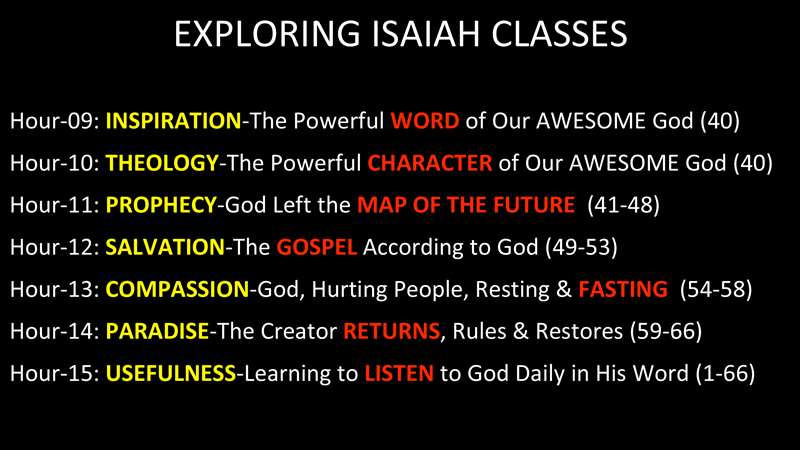
The rest of the book of Isaiah we're going to cover. Now we're on chapter 40. We talk about the Word of God. Remember, the grass withers, but the Word of God lasts forever. That's what we find in Isaiah. And the whole doctrine of inspiration we're going to study the powerful Word of our awesome God. Then, surrounding in chapter 40, is the character of God. We learn more in chapter 40, theologically, than almost any other part of the Bible. It's like a systematic theology of the character of God.
Then, by the time we get to chapter 41 of Isaiah, we find out that God doesn't want us to be in the dark, and that's why this was written. He was writing this to the people that were fearing the Assyrians and the Babylonians, and He says, hey, you've got the inspired record, you've got the theological truth about God, and I'm going to tell you the future. Wow. Did you know God says the way you know He's God, He's the only one that knows the future. Nobody else knows the future. No other religion claims to know the future and has accurately told it. Now a lot of people claim to know it, but few tell the truth.
Did you know that the Bible has never been disproved of any of these prophecies? All of them that the Bible predicted have come true, including the destruction of Nineveh. Obadiah, you've heard of Obadiah? Remember Obadiah, Jonah, Micah, Nahum? Obadiah said that Babylon would be overthrown, that Nineveh, I'm sorry, would be overthrown by the Babylonians. With fire, that was the king burning his stuff, and with a flood of water, and people went, you can't have flood of water and fire. And by the way, Nineveh was so completely destroyed, it was not known where it was until the year 1838. Herodotus, the great Greek historian, went to the Middle East in, what, the 4th century BC. 3rd century B. C., like a couple hundred years after Nineveh, he couldn't find the city and he wrote in his history, Nineveh is not a, it's not a real city. It was discovered by a British archaeologist in 1838 and what he found is that the Babylonians diverted the water of the Nile and while, I mean of the Tigris and Euphrates, and while the king was burning his stuff, they let the water go. And it washed the clay brick walls of Nineveh down. So, it was destroyed by a flood, like Obadiah said, and by fire, like Obadiah said.
So, we're going to see prophecy and look at all that to map the future. Oh, Isaiah contains what is probably the greatest chapter of the Old Testament, Isaiah 53. God explains the Gospel. Isaiah talks about how to have compassion. What does God think about justice, about hurting people, about oppression? What does God think? That's all about Isaiah 54 to 58. And you know what God says? We are supposed to be resting in our lives and we're supposed to be fasting. When's the last time you heard a sermon on fasting? In the Library of Congress, there's not a book written on fasting from the Civil War until the late 1940s. That was almost 80 years that no book was published in America on fasting. Why? Because it's not a big topic. No one thinks about fasting. They think of dieting, right? But not fasting.
Paradise. What happens when, and this is Isaiah 59 to 66, what happens when the Creator Messiah returns? God tells what the world will be like. And then finally, the last lesson, we're going to survey the book again, all 66 chapters, and talk about how to be useful and listening to God.
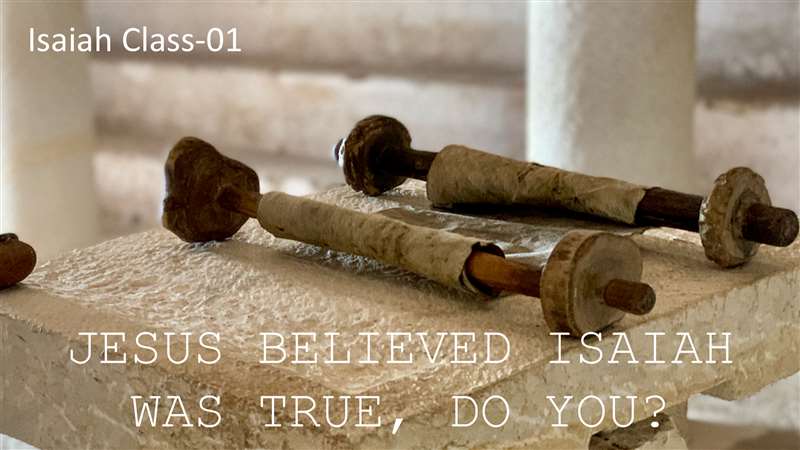
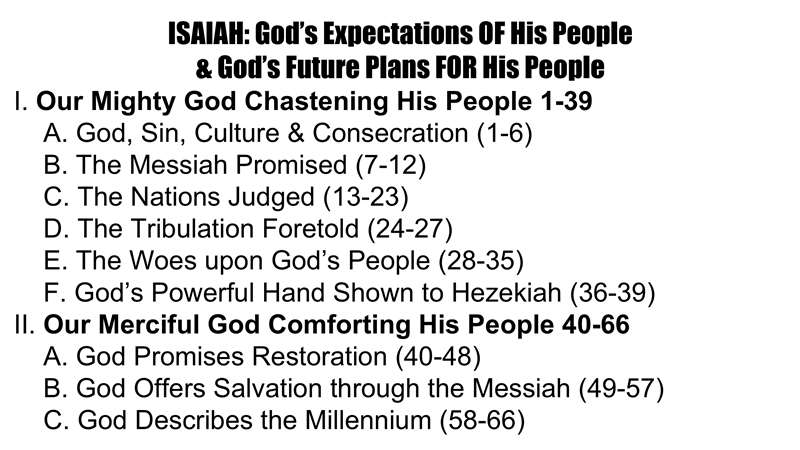
Now, this is in your notes. Jesus believed Isaiah was true. And my question to you is, do you? Here's the outline that's in your notes. And the outline of Isaiah completely parallels the Bible. How many chapters are in Isaiah? Yes. (Student responds to Dr. Barnett.) How many books are in the Bible? (Student responds to Dr. Barnett). Isn't that interesting? The whole layout of the book of Isaiah parallels the Bible. The first 39 chapters of Isaiah is about God chasing His people. The last chapter, starting in chapter 40 through 66, is about God comforting His people.
That's exactly the Old Testament. The New Testament is the first 39 books of the Bible, and the New Testament is the last 27 books of the Bible. And what does Isaiah 40 talk about? The voice of one crying in the wilderness, make ready the way of the Lord. How does the New Testament open in Matthew? With that very verse. It's John the Baptist saying Christ is coming. There's a phenomenal parallelism between the outline of Isaiah, and by the way, we'll talk about how we even got the Bible in the form it is.
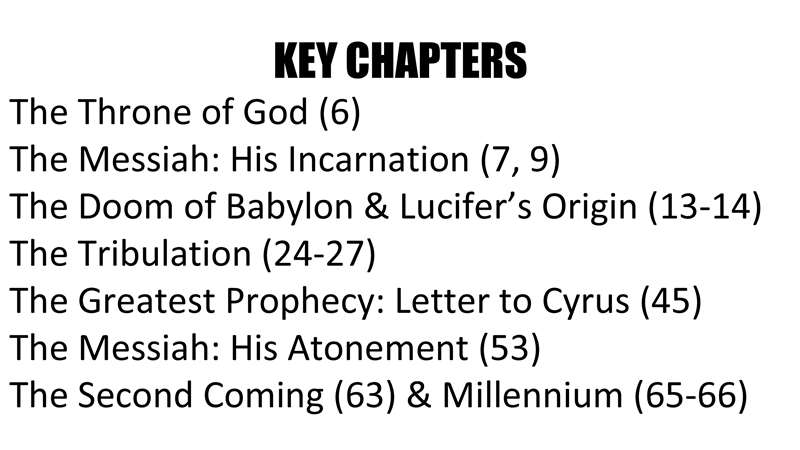
Here are the key chapters, and by the way, some of these will be on your Isaiah test. Isaiah 6 is the throne of God, the Messiah's in 7 and 9, the doom of Babylon and Lucifer's origin is 13 and 14, the, we call this the mini-Tribulation it's what Jesus quotes in the sermon that He gave about the Tribulation. Probably the greatest prophecy, the most amazing one, is God names a future ruler 200 years before he's born. It would be like me saying in the 1500's that a guy named George Washington was going to be coming to liberate America from Britain. If I'd have said that in 1500, everyone would look at me. Britain was the ruler of the world, and I'm naming a person? God named, by name, the ruler of the Medo-Persian Empire, Cyrus, and He says, you're my servant, and you're going to let My people build their temple. That's chapter 45, the greatest chapter, and then the Second Coming of Christ in the Millennium, and it's 12:30, and we'll pick up tomorrow, right there, or whenever I do this again.